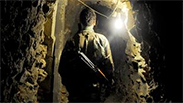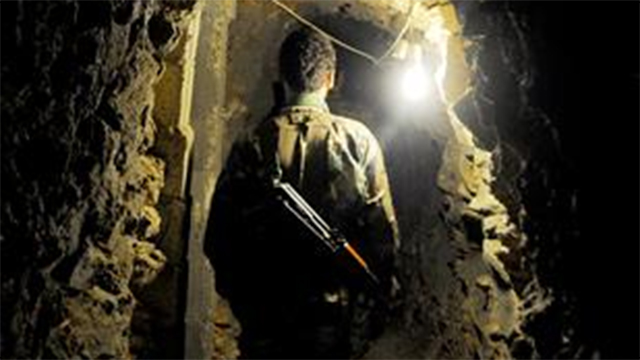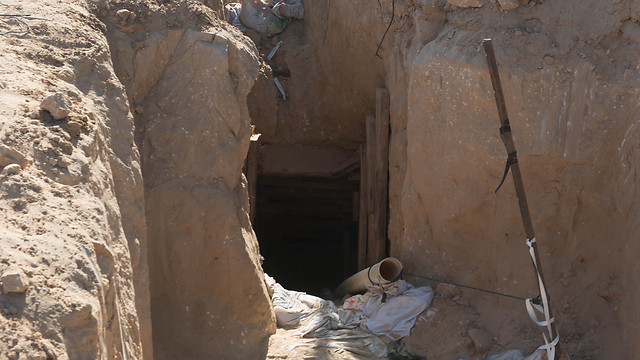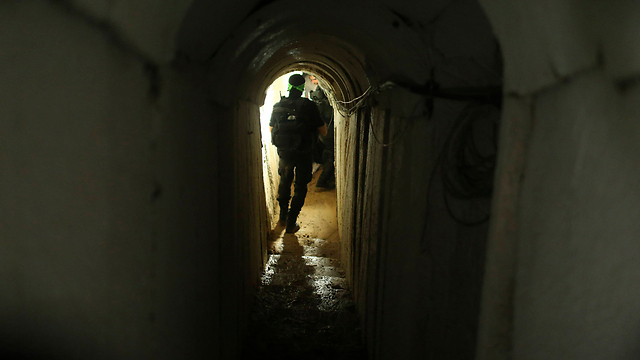
What motivates a Gazan to dig a tunnel
Paid for their efforts with a monthly salary, more and more Gazans take part in Hamas’ effort to reach Israel and carry out acts of terrorism; three recently captured in Israel explain their reasoning and motivations.
On April 6, a man from Gaza named Mahmoud Atauna infiltrated Israel. The feat didn’t take a great deal of effort or resourcefulness; all he needed to do was jump over a barbed wire fence and then crawl under a second fence. After he was caught, he had told his investigators that was planning on killing IDF soldiers.
Another Gazan resident named Medhat Abu-Zenima had crossed the same border a week prior to Atauna. He had initially intended to cross the border to Egypt in search of his brother Abdallah, who had joined ISIS in the Sinai Peninsula. When he saw the large presence of the Egyptian army along the border, however, he tried returning to Gaza, eventually deciding to flee to Israel.
Another young man, whose identity remains unrevealed, had infiltrated Israel from Gaza a month earlier after a physical altercation with his father, who had suspected he was courting the neighbor’s daughter.
After being interrogated by the Shin Bet and the Police Central Unit, all three have been indicted on security offenses and are currently awaiting trial at Shikma Prison in Ashkelon. They are not alone, though: since the beginning of the year, 61 Gazans were found to have illegally crossed the border into Israel, out of which 14 have been indicted on security-related matters. In 2015, 25 Gazans were intercepted and indicted, all of them being either active or former members of Hamas, and some having recently been at work digging tunnels to Israel. Their testimonies offer a rare glimpse into the growing underground world in Gaza, including the methods used by the diggers, their daily routine and even salary.
So far, those arrested have provided valuable intel regarding the military wing of Hamas, their involvement in tunnel digging, the names of other active members, available weaponry and forms of training. But their testimonies also included a different form of vital information: in describing the abject poverty and lack of employment opportunities that contribute to thousands of young Gazans digging underground tunnels for $150–200 a month. The job is intense, runs around the clock and includes both tunnels that pass through Gaza as well as those that cross over to Israel.
Two knives for a better life
Atauna was living in the Gazan refugee camp of Jabalia with his parents, wife and two children. He told his interrogators he had decided to infiltrate Israel armed with two knives because of his family’s dire financial state. “I took them with me to Israel to stab some Israeli I might run into, maybe a soldier. That way I would go to prison, and my children would get a better life, since the PA gives a salary to (the family of) every prisoner.”He further explained that what made him want to hurt and kill Jews was “what you see on television, shooting Palestinians in the street and executing them, like what had happened with the Hebron soldier.”
Atanua joined Hamas’s military wing back in 2006 and was an active member until 2014. His training included weapons usage, running and crawling. After he had finished with his training, Atanua joined Hamas’s armed civil guards unit, called Ribat.
“Ribat's job is to handle collaborators and act as a defense against the IDF’s entry to the area,” said Atanua. He added, though, that his joining was not mainly motivated by ideals. “What I was looking to get from Ribat was a livelihood of $100 a month for my work.”
In addition to taking part in an RPG course and driving Hamas fighters to its various outposts, Atanua also became involved in tunnel digging. “In 2007, I got $150 for working on a tunnel in northern Gaza for two months,” he told his investigators, stating that he also worked on “an internal tunnel used by Hamas activists to escape the range of the IDF’s unmanned planes.
He shared the daily routine of his tunnel digging days down to its grueling details. “We would use a steel wheelbarrow to remove the sand and supply us with the end of an oxygen tube. We dug about 3 to 4 meters a day, and the foreman would bring us drinks and two meals a day.” The tunnels reached 250 meters, and, in addition to hiding from aerial strikes, would be used “to surprise ground IDF soldiers during times of war.”
The Gazan man whose name cannot be disclosed told of his own experiences. “We would work at night, from 10pm to 5am, every day except Friday,” he said, adding, “My job was to do the digging, clean up (the tunnel and lay down tracks used by the trolleys that delivered supplies and carried out the waste —OS & IC).”
An RPG tucked under your bed
The nameless infiltrator elaborated on his duties in a particular tunnel belonging to Hamas’s Qassam Brigade. “I finished work there about 4 months after the war in Gaza (Operation Protective Edge), after which new workers came in and continued the job. I believe the tunnel has already passed the border and gone into Israel.”
According to his testimony, he was asked to lower four explosive devices into another tunnel. “We walked about 100 meters into the tunnel, until we reached the workers’ bedroom, where we placed the explosive devices in a blue container, closed it and left.”
He went on to say that yet another tunnel he had worked on, which was 200 to 400 meters long, “was used to allow the Nokhba (Hamas’elite fighting unit) to attack the Israeli army and carry out suicide attacks against the IDF, kidnap Israeli soldiers and enter Israeli territory.” He added, “Our instructions were to arrive in civilian clothes, instead of military apparel, and to bring a change of clothes due to the dirt and to avoid raising suspicion.”
Both he and Atanua were involved in setting explosive devices near Gaza’s border with Israel, in addition to storing weapons in their own homes, including rifles, rocket projectors and explosives devices. Atanua was paid 300 shekels a month for this, but when his father found out about it, he made Atanua remove all the weapons from his home. The other man kept an RPG projector and a Kalashnikov rifle near his bed, for which he received $200 a month.
Abu-Zenima started out working in a tunnel and eventually became a partner in one. Through his tunnel, “We smuggled tobacco, cigarettes, Kalashnikovs, crates full of ammunition and lead pipes that weighed roughly 500 kg, which from what I understood were to be used to make rockets in Gaza.” According to him, all of these goings on were done with the full knowledge of Hamas. “They would receive a tax percentage of the goods that passed through our tunnel,” he explained. “I don’t klnow how much.”
Abu-Zenima’s eventual capture was the result of fear and a personal blunder. “I had no intention of getting to Israel,” he told investigators. “I initially wanted to reach Egypt and look for (my brother) Abdullah or get information on him, whether dead or alive.” After noticing the Egyptian army along the border, he tried returning, which was when he came across a group he took for Hamas soldiers. “I just started running from them,” he said. “I jumped over the fence into Israel, walked about 100 meters, took off my shoes and jacket and sat down on an asphalt road. I lit up a cigarette from the fear of getting killed for coming too close to an Israeli military base. Fifteen minutes later, an Israeli jeep drove by and arrested me.”
When asked to explain why he had run from Hamas to begin with, Abu-Zenima explained, “I was in a sensitive area and was afraid Hamas might think I was returning from (the Jewish settlement of) Kerem Shalom, and that I was a collaborator.”
All three of the men arrested will be legally represented by Muhammad Jabareen. They are set to appear before a court in Be’er Sheva and will face the possibility of a long prison sentence if convicted.
It should be noted that the IDF has invested substantial technological, operational and intel-related resources to thwart Hamas’ tunnel digging. An officer in the Israeli army referred to the ongoing battle, stressing, “We are not sitting on the fence here.” The information provided by infiltrators from Gaza such as the three mentioned in this article is part of these efforts.
(All quotations were taken from investigations’ transcripts.)













